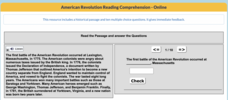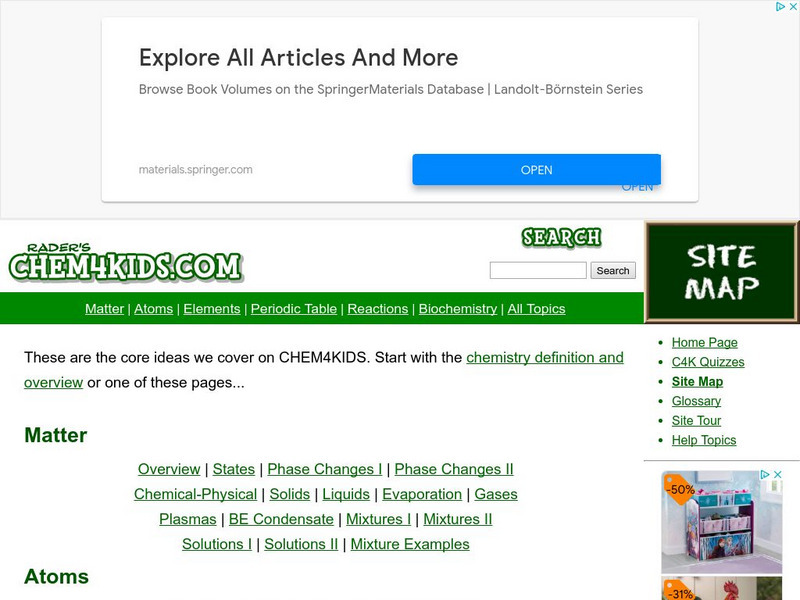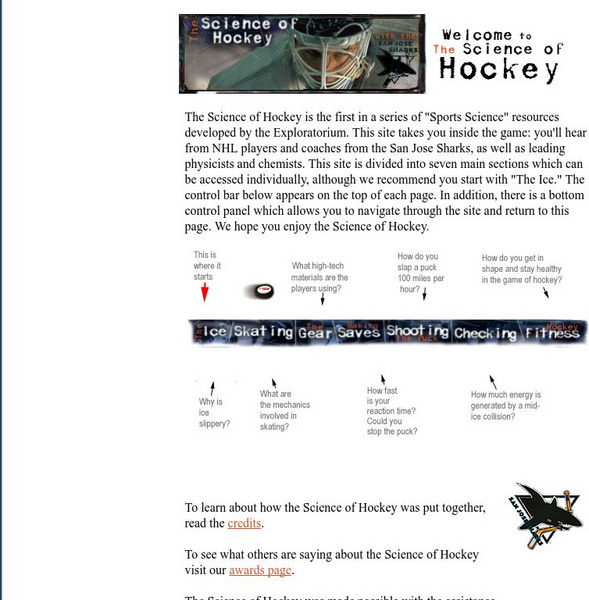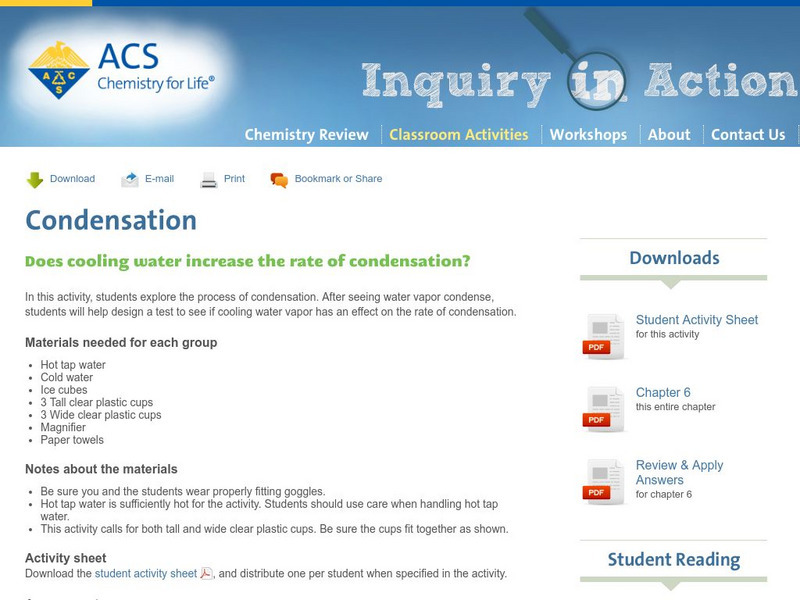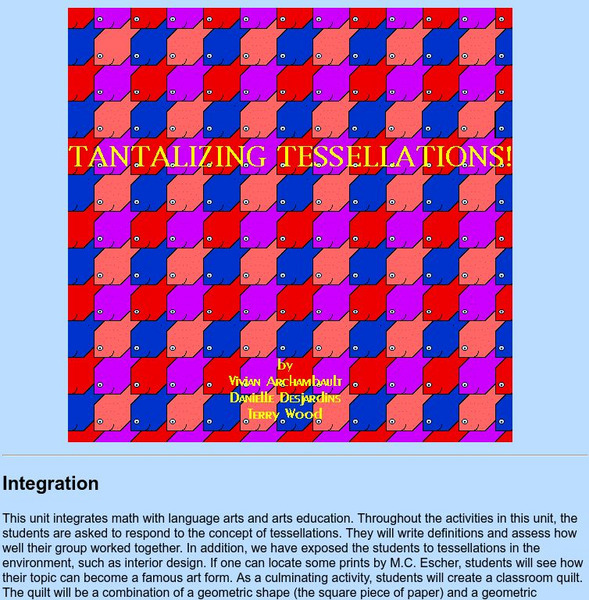Core Knowledge Foundation
The Civil War
A student reader shares information about the history of slavery, the Civil War, President Abraham Lincoln, women's contributions to the war, the Emancipation Proclamation, and reconstruction.
Mr. Nussbaum
American Revolution
Test scholar's reading comprehension skills with a practice that challenges pupils to read an informational text about the Amerian Revolution then answer 10 questions.
Chem4kids
Chem4 Kids: Chemistry Careers
Chem4Kids! looks at careers available in the large field of chemistry. Here you can explore the career of a doctor, pharmacist or pharmacologist, university researcher, forensics expert, or hazardous materials expert.
Exploratorium
Exploratorium: The Science of Hockey
If you love hockey - or are just curious about hockey - you will really like this site. There is a lot of information about the components of hockey. You can learn what equipment is necessary, how slapshots are made, and how to skate...
John F. Kennedy Center
The Kennedy Center: Lesson: You Too Can Haiku
Here's a creative activity for young scholars to examine various haikus, and Japanese culture, then write their own haiku poem, and illustrate it using watercolors! Provides plenty of links to more information, a thorough explanation of...
John F. Kennedy Center
The Kennedy Center: Exploring Weather Conditions in Paintings
Enrich your science instructional activity with watercolors! This lesson plan contains assessment criteria, links to more information, and step-by-step ideas to cultivate your young scholars' knowledge about weather conditions.
Houghton Mifflin Harcourt
Harcourt: School Publishers: Introducing President George W. Bush!
Interesting and easy-to-read biography on George W. Bush, the 43rd president of the United States. Written at the time of his first election as president.
Michigan State University
Michigan State University: Digital Learning Center for Microbial Ecology: Microbe Zoo: Ag Acres
A simple overview of the important roles microbes play in agriculture. You'll learn how some microbes can be hazardous to plants while others help fertilize and build soil, and kill insects.
National Endowment for the Humanities
Neh: Edsit Ement: All Together Now: Collaborations in Poetry Writing
Three learning activities to teach K-2 students about poetry. Very detailed lessons with references and other suggested activities. Ways to individualize and academic content standards are noted. (Attachment may not load in archived URL.)
National Endowment for the Humanities
Neh: Edsit Ement: I've Just Seen a Face Portraits Lesson Plan
This website contains a lesson plan in which students attempt to analyze different types of portraits for better understanding. It contains 6 different lessons in which students look at examples of portraits of children, important...
National Endowment for the Humanities
Neh: Edsit Ement: Born on a Mountaintop: Davy Crockett, Tall Tales & History
These four lesson plans integrate the life of Davy Crockett and the tall tales that were created about him. Includes a printable rubric, instructional activity extensions, links, and much more!
American Chemical Society
Inquiry in Action: Condensation
In this activity, students explore the process of condensation. After seeing water vapor condense, students will help design a test to see if cooling water vapor has an effect on the rate of condensation.
American Chemical Society
Inquiry in Action: Exploring Moisture on the Outside of Cold Cup
In this activity, students investigate how condensation causes moisture to form on the outside of a cold cup. To see if the condensed water vapor comes from the air, students use 2 cold cups, but limit the air around one of them by...
American Chemical Society
Inquiry in Action: Explore Moisture on Outside of a Cold Cup (Dry Environment)
Regardless of the time of year or region of the country students live in, they have likely experienced moisture on the outside of a cold drink or another cold surface. In this activity, students will prepare a sample of humid air since...
American Chemical Society
Inquiry in Action: Defining Density
Do heavy things always sink and light things always float? In this introductory demonstration and activity, students are introduced to the concept of density as they explore a rock and a wooden block in water.
Birmingham Museums Trust (UK)
Birmingham Museum & Art Gallery: Investigate Real Egyptian Artifacts
A short list of artifacts dating back to Ancient Egypt with descriptions and images. Additionally, find links for activities, a timeline, and details of mummies to enhance study of the early civilization.
PBS
Pbs Learning Media: Waterslides
Join Valerie and Margie as they devise ways to measure how fast and how "wild" two water slides are in this video from DragonflyTV. [3:12]
PBS
Pbs Learning Media: Creepy Crawlies
This interactive feature from the NOVA: "Odyssey of Life" Web site explores the often unwitting relationship we share with the billions of "creepy crawlies" that reside in our bodies and in our homes.
PBS
Pbs Learning Media: Scent of an Alewife
This video segment from NOVA: "Sea Behind the Dunes" tracks the return of spawning alewife fish from the open ocean back to the freshwater streams and ponds where they were born. [3:34]
PBS
Pbs Learning Media: The Power of Touch
This video segment explores the role of touch in the development of young animals, including humans. Footage from NOVA: "Mystery of the Senses: Touch." [2:57]
PBS
Pbs Learning Media: Reading a Thermometer
In this video segment from Cyberchase, the CyberSquad learns how to read a thermometer as they try to keep their chocolate sculpture from melting.
Scholastic
Scholastic: Activities: Dinosaur Picture Book
Learn who Benjamin Waterhouse Hawkins was, and how his art contributed to our understanding of dinosaurs.
University of Regina (Canada)
University of Regina: Math Central: Tantalizing Tessellations!
For this unit, students will be taught several techniques for creating tessellations and will respond to their learning in their Math journals.
Shodor Education Foundation
Shodor Interactivate: Lesson: Fire!, Probability, and Chaos
Students will simulate the probability of a forest fire then graphing the data.



